Everything you Need to Know About Water Filtration in Your Camper Van or RV
With the constantly varying water sources that we consume as a van lifer, it is crucial to understand types of water filtration, when we should filter our water, and how to be sure that the water we are using everyday is safe. By the end of this guide, you will be a pro at camper van water filtration. While we are van lifers, we want to be clear that these solutions can be utilized in any nomadic vehicle from RVs to School Busses, and more!
In this guide we cover:
- The Science of Water Filtration and Various Types
- Camper Van Water Filtration Recommendations
- Inline Filters
- 3 Step Canisters
- UV Water Purifiers
- Travel Berkey
- Level Up: Off Grid Systems!
- How to Filter Water Directly From Streams and Rivers
- Our Camper Van Water Filtration Strategy
- Frequently Asked Questions!
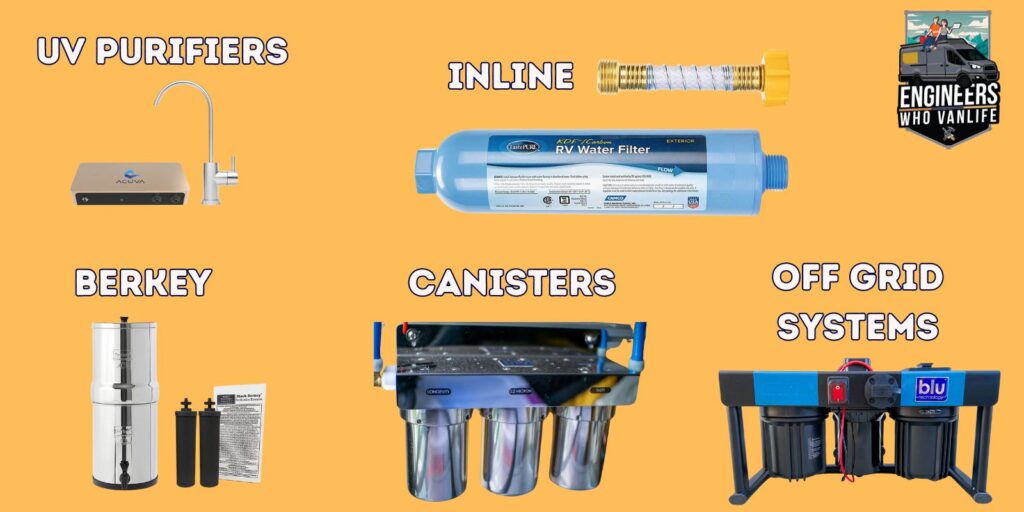
** Disclaimer: This post contains various affiliate links that provide a small kickback to us. We appreciate your support if you choose to do so! **
The Basics of Camper Van Water Filtration
As with everything on our blog, before choosing the correct solution for you, it is crucial to understand how things work, and the pros / cons of your options. We will first dig into the hows, and the whys, and then we will share recommendations so that you can construct your perfect solution.
Camper Van Water Filtration and Particle Size
The first metric to be aware of for effectiveness of a camper van, or RV, water filtration systems is particle size. All water filters that remove particles will be rated in terms of the micron size they filter down to. For example, a 5 micron filter will filter all particles greater than or equal to 5 microns. What does that mean for you? In the chart below we show you the sizes of things like bacteria, viruses, and mold to help you understand what different filters will filter out, and what they will not. Micron ratings are relevant for filters like mechanical filters, carbon filters, and any other water filter that filters by passing through a medium but not UV filters.
Fun fact: the threshold for a what a human can see is around 25 microns.
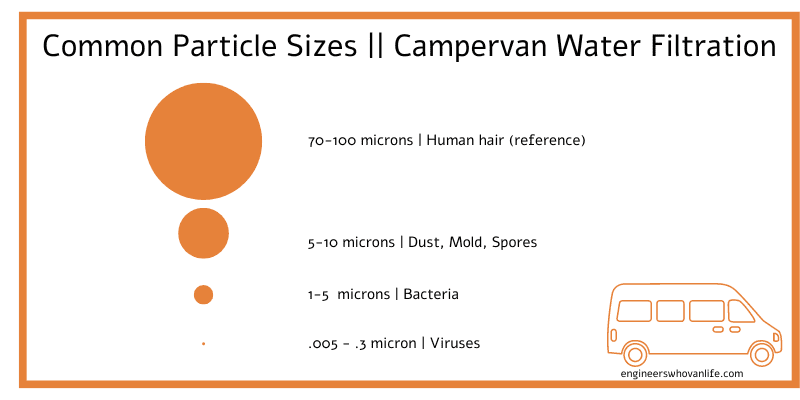
Often we see van lifers screw a 20 micron filter onto their hose and rely fully on that for their filtration. As you can see in the chart above, 20 micros in NOT sufficent for much more than physical particles. However, what it is good for is extending the length of your more fine grained water filter mediums by straining out larger particles.
Types of Water Filtration and Purification
There are 4 types of water filtration, or purification, that we will address in this guide. Three of them are useful as RV, or camper van, water filtration systems.
- Mechanical Filtration
- Activated Carbon Filtration
- UV Water Purification
- Reverse Osmosis – Not recommend, but we want to address why.
1. Mechanical Filtration
Mechanical water filtration can be thought of as a strainer. Water passes through the strainer medium and keeps particulate matter (sediment) out. These filters are rated by what micron they filter down to. These are generally used in stages as to filter from coarse down to fine so that you don’t clog up your fine strainer with large particles. In most systems this is a mesh filter placed on the entry or exit to the water tank.
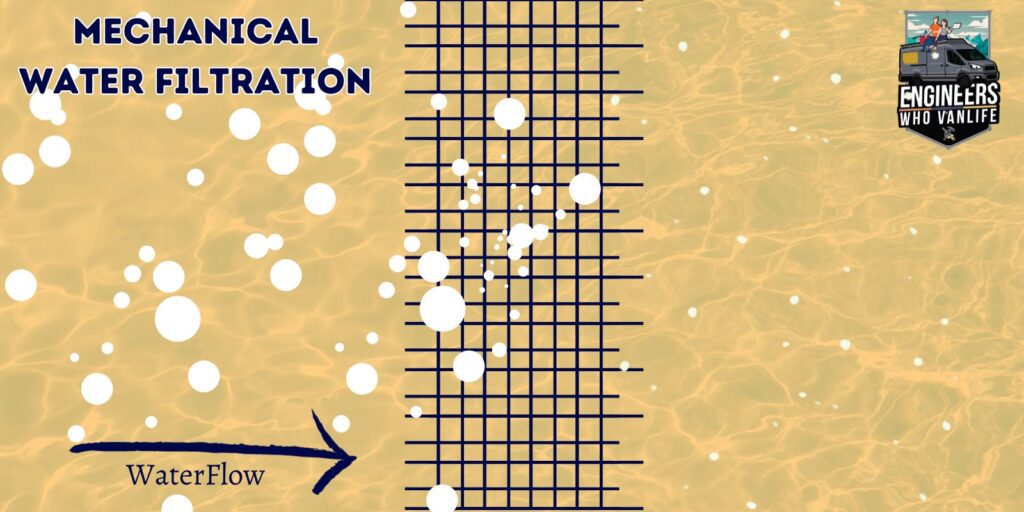
2. Activated Carbon Filtration
Activated Carbon (aka Activated Charcoal) filtration pulls contaminants out of water through a process known as adsorption. This is not the commonly know “absorption” which is more like a sponge process; rather, adsorption is the process by which chemicals, heavy metals, and other contaminants bind to carbon as they pass through; thus are pulled out of your water. There are two sub-types of carbon filtration: chemical and physical adsorption, but they both have the same result.
Fun fact, one gram of activated carbon has 32,000 square feet of surface area! When all of the available binding sites are taken up, you need to replace your filter. For this reason, it is important to follow the replacement recommendations for whichever filter you purchase.
Think of it this way: Have you ever taken activated charcoal, or given it to your pet, after consuming something you shouldn’t have? That is the exact same process! The activated charcoal that passes through your system, binds to whatever is present, and pulls it out.
What do activated carbon filters remove from water?
Not all activated carbon water filters are created the same. For example, there are carbon block filters which are densely packed, fine grained carbon that reduce channeling and provide more filtering than something like a GAC (granulated activated carbon filter) which is made from larger particles.
Carbon filters are most commonly used for removing chlorine from water as it is added by most states to public water as a disinfectant. In addition, they also remove herbicides, pesticides, and other organic contaminants as these bind to the carbon. Carbon block filters are even capable of filtering waterborne pathogens, and heavy metals such as lead.
Generally carbon filters are utilized as pre-filters for your main filtration system.
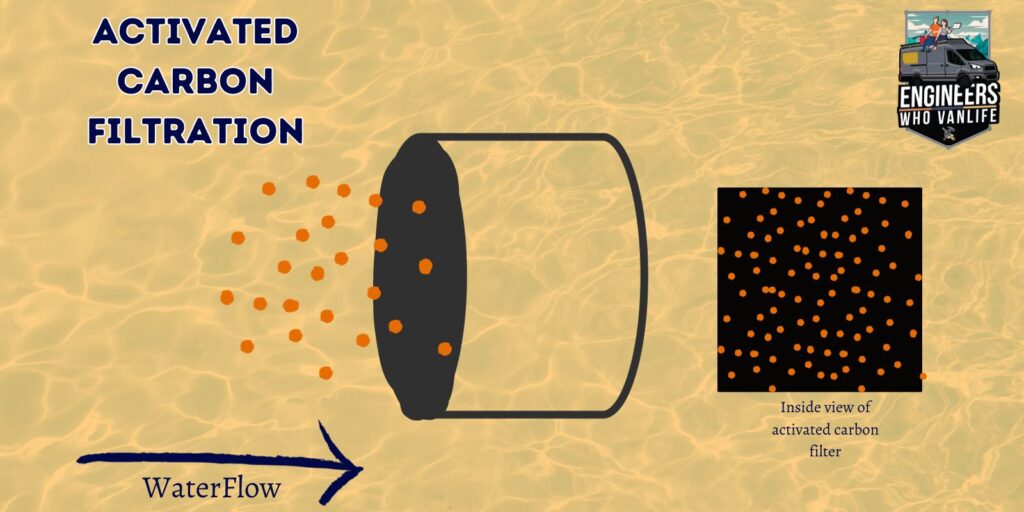
3. UV Water Purification
Treating water with UV light is known as water purification, not water filtration. This is an important distinction as the process does not remove anything, rather it kills off any harmful contaminants. More specifically, UV water purification uses a germicidal ultraviolet wavelength that disrupts the DNA in pathogenic bacteria, and viruses, in turn rendering them unable to reproduce. In easier terms, UV water purification stops disease and virus from spreading throughout your water, but it does not remove the dead particles.
UV water purification treatment is effective for inactivating bacteria such as E.coli, salmonella, fungi, girardia, and the like which are too small to be removed by mechanical, or carbon filtration.
A lot of times UV water purification is the last step in a water system and done at the point of use.
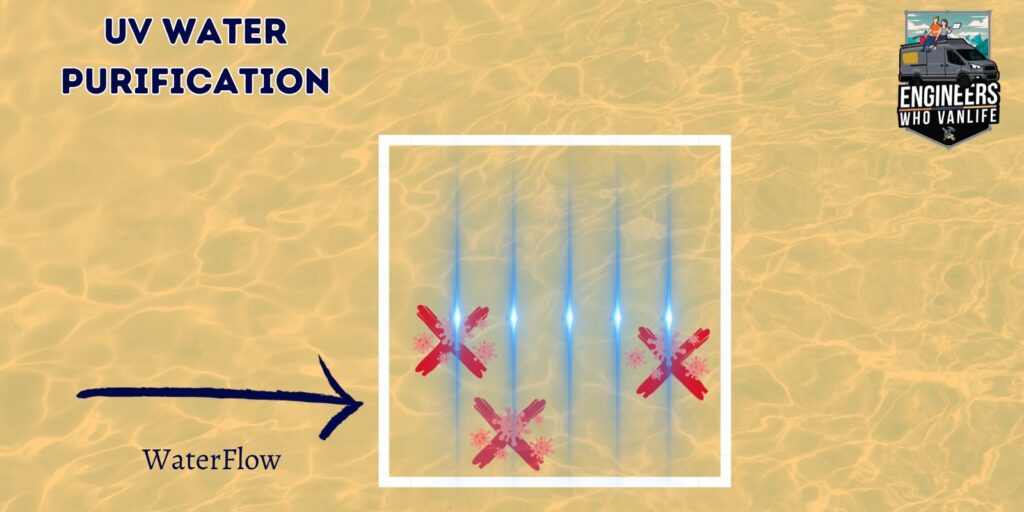
4. Reverse Osmosis (Not Recommended for Van Life)
Reverse Osmosis (RO) is an effective method of water filtration generally; however, we do not recommend it for van life. RO works by pushing contaminated water through a permeable membrane that allows only certain molecules through. This in turn leaves water on the other side of the membrane de-ionized and decontaminated. However, the reason we do not recommend this for van life is because of the “reject stream”. Typically, there is a 1:1 pure water to waste water ratio. This means that for every clean cup of water you get, you have to discard another cup via the reject stream. Water conservation is of utmost importance for nomadic folks with small water tanks so this is not a good option.
A Note on Water Stagnation
Water stagnation is something to be aware of especially if you are not living out of your van, or RV full time. If water sits for too long, bacteria and algae can begin to grow. Because of this, there is a lot of debate about where carbon filters should be placed due to the fact that they pull out chlorine which can prevent this algae growth. If you place your carbon filters before your water tank, then water stagnation problems can potentially be worse than if you place your carbon filters after your tank. Of course, then you run the risk of your fresh water tank not being entirely potable water. As full timers, our water is continuously flowing so we do not worry about water stagnation all too much. If you are part time, you might want to consider simply draining your water system when not in use for extended amounts of time.
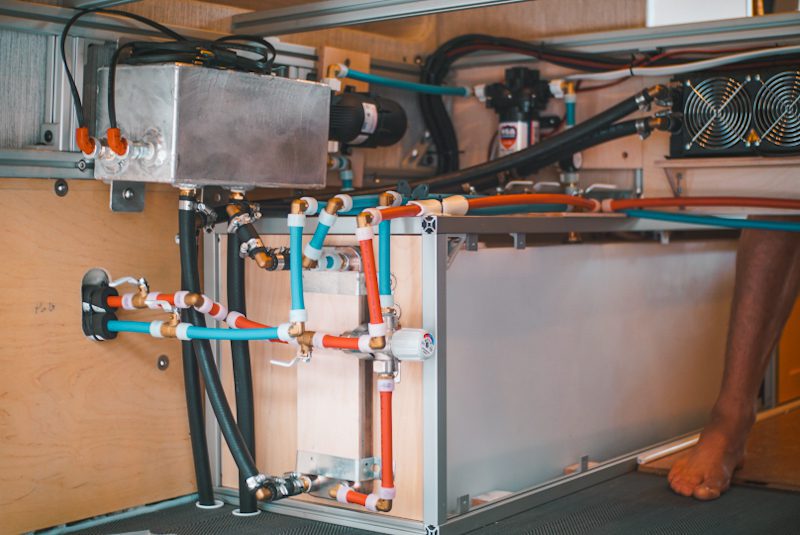
Camper Van & RV Water Filtration Recommendations
Now that you understand how water is filtered, let’s talk about some of the best solutions. As with everything in a van build, what you decide to go with is entirely up to you and your personal use case.
Here are the water filters and purifiers that we will discuss:
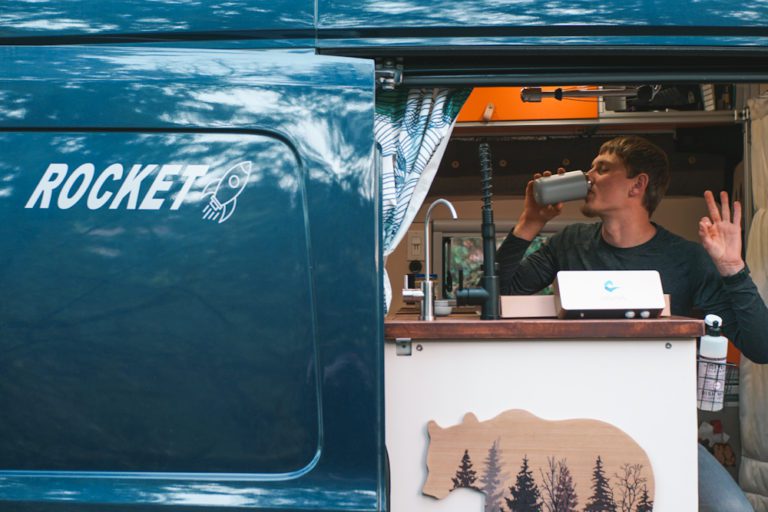
Camco TastePURE Inline Water Filter - Screw on
The Camco TastePURE Inline filter is a simple way to add an extra aesthetic/taste improvement to your campervan water system. You simply screw it on to the end of your hose and it filters as it goes through. It is a small filter so it is simple to store, and it screws on very easily. Inline water filters like this one are often 20 micron GAC (granulated activated carbon) so cannot be relied on for removing anything like bacteria and viruses.
Price Point: ~$20 for 2.
Inline Camper / Rv Water Filter
These are NOT for filtering bacteria and viruses due to the 20 micron filter size. However, these can be utilized for more aesthetic improvements like bad tastes, odors, and physically visibly sediment.
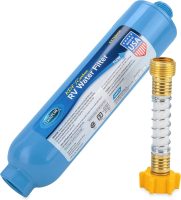
3 Stage Inline Canister Systems
Inline canisters are generally systems of 2-3 mechanical and carbon filters that provide narrowing levels of filters. For example, they will start at 5 microns as the first filter, and end with a filter of .2 microns. Inline canister systems are excellent for RVs and camper vans as they are easy to install, service, and filter water to a safe degree! The two systems we have experience with and recommend are ClearSource and BluTech.
1. ClearSource Ultra RV Water Filter
ClearSource Ultra RV Water Filter system is a fixed 3 stage filtration system. It includes:
- 5 micron mechanical filter
- .5 micron carbon filter
- Patented VirusGuard filter which is an electro-adhesive material that traps bacteria, and viruses.
You mount this system near your water tank. Most van lifers opt to filter on the way into their water tank; however, you could also filter with this after your water tank. This is an excellent filter; however, does require quite a bit of space for mounting.
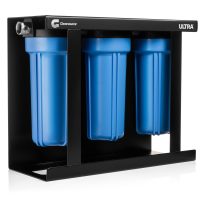
2. BluTech Trio 3-Stage Fixed Mounted Water Filtration System
The BluTech Trio 3-Stage Fixed Mounted Water Filtration system is similar to the ClearSource system but is more compact which is great for small spaces like camper vans.
The filtration stages are:
- “Longevity” mechanical pre-filter for large particles
- .2 micron filter for bacteria and viruses
- “Tasty” filter of activated carbon and coconut shell for taste and smell improvements
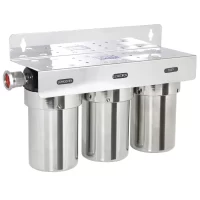
Acuva ArrowMAX UV-LED Water Purifier
Another way to add a high level of confidence to your water system is with UV water purification. This is often placed at the point of use (faucet). The most common way to use UV water purification in a camper van, or RV, is with the Acuva ArrowMAX series. We have personally installed the Acuva ArrowMAX UV-LED 2.0 in both of our camper conversions. You can read our full review on the Acuva systems.
The Acuva UV-LED water purification systems are comprised of a small, sleek unit that sits under your sink where the UV-LED purification happens and an advanced pre-filter where particulate matter such as lead, heavy metal, chlorine, mercury, and carcinogens are removed via carbon filtration. We have depicted the setup below!
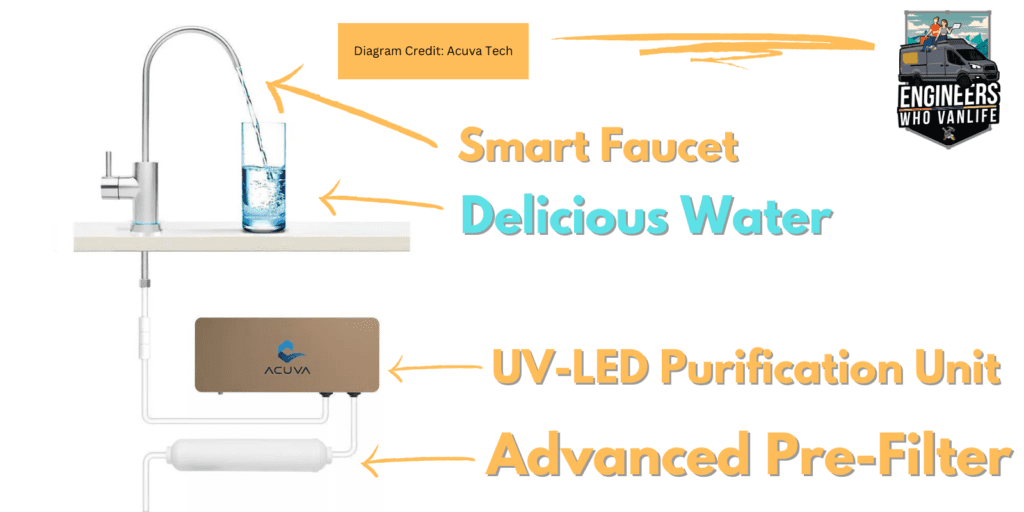
We recommend the Acuva ArrowMAX UV-LED 2.0 for camper vans and the Acuva Arrow UV-LED 5.0 for RVs. The number (2.0 vs 5.0) simply refers to the flow rate of either 2 L/m or 5 L/m
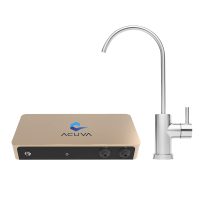
Travel Berkey
Travel Berkey’s are gravity fed water filters. There are 3 parts to the Berkey water purification process:
- Micro-filtration
- Absorption
- Adsorption
These all occurs in the top portion of the Berkey via 2 replaceable filters. By the time “dirty” water reaches the bottom of your Berkey, it is free of 99.9% of viruses, bacteria, sediment, and more. However, it is important to note that Berkey filters do not have NSF (National Sanitation Foundation) certifications as they rely on their own testing.
This type of water filter is loved by many van lifers as you can just pour water from anywhere into the top. However, they take up a large footprint on your counter.
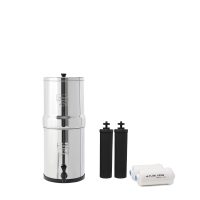
Bonus: OFF GRID Water Systems!
If you are like us, water is your biggest limiter to staying off grid as a van lifer. We run out of water before we run out of food, or gas even. We were pretty stoked to find portable systems that allow you to pump water from lakes and streams and into your water tank. Filtering along the way, of course! Extra bonus: we will also show you how to DIY this feature into your existing water system.
1. BluTech MRX+ or Guzzle H20
There are two options for portable off grid water filters that we recommend:
- Blu Tech ARX+ 4 Stage Off Grid Water Filtration System
- Filters to .2 microns
- Pumps + filters 3 gallons per minute
- Price: $824.99
- Guzzle H20 Stream Water Filtration System
- Filters to .5 microns
- Pumps + filters .75 gallons per minute
- Price: $1,100
These units both have a 12v water pump to pull water from unpressurized sources like lakes and streams.
Our one gripe with these systems is the hose length, it is rare to find a natural water source that we can back right up to. However, to solve this we simply keep a 5 gallon bucket in our garage and make a couple of trips. It is well worth the space for us, we LOVE glacier stream water.
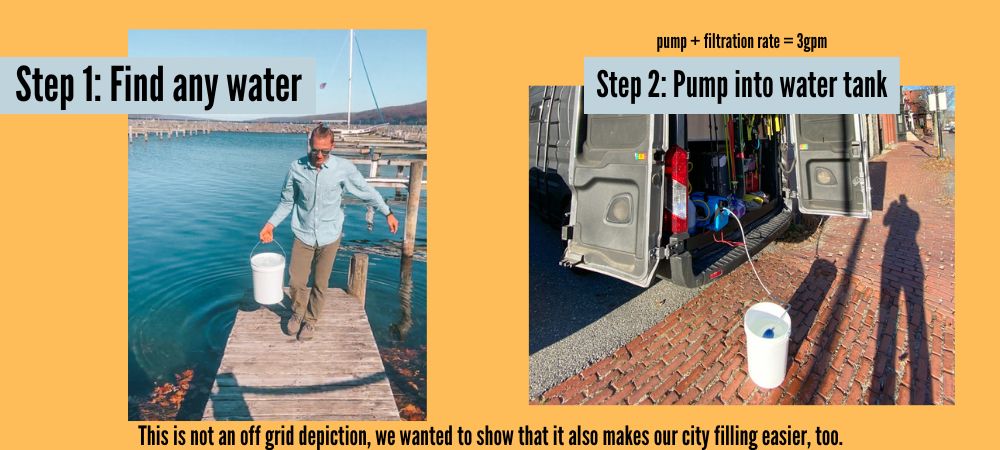
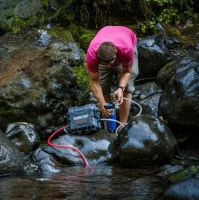
2. DIY Off Grid Water System
If you’ve been around our blog, or Instagram, you know we are all about DIY options! Before we drove up to Alaska in our camper van, we re-configured our existing plumbing system to pull AND filter water from unpressurized water sources like lakes and stream. We detailed the entire process in it’s own blog post: Filter and Fill Your Water System from Fresh Water Sources.
Frequently Asked Questions About Van Life Water Filtration
What camper van water filtration system is right for you?
The best water filtration system for you is the one that you are going to be the most comfortable drinking water from. It sounds silly, but we have met van lifers who buy jugs of water because they don’t trust their systems. To us, your van is your home, you should be trust the systems!
To feel confident, we personally:
- Filter water into the water tank with a Blu Tech 3 Stage Canister System
- UV purify water at the point of use for drinking water with an Acuva System
- DIYed the ability to filter and fill from fresh water sources
This might sound like overkill to some; however, we like knowing that if we don’t use one system, we have another system to keep us safe. Redundancy is key.
Why do I need to filter "potable" water?
Generally, van lifers fill up their fresh water tanks at “potable” water spigots. However, even potable water sources can pick up sediment and bacteria between leaving the source and entering your holding tank. In our eyes, adding filtration, or purification, puts our minds at ease because you just never know! Additionally, filtering water with a carbon block (more on this later) removes bad odors and taste, which still exists in potable water.
Are there specific considerations for RV water filtration?
The principals of water filtration for RVs is identical to campervan water filtration, except with the luxury of space. When space is not an issue, the ClearSource Ultra RV Water Filtration System is the overall winner for best RV water filter. With three 10″ filters filtering at 5.0, 0.5, and 0.2 um, you are sure to remove particulates, rust, bacteria, and even small viruses from your water! You can swap out your filters every 6 months with these replacement filters and always feel safe drinking filtered water from your RV.
How often should you change the water filters in a camper van?
More frequently than you think! Generally, filters should be replaced every 3-6 months; however, this will vary based on your water filtration system and your water usage. The best bet is to simply follow the guidance on whichever filter you choose.
Are there specific requirements for installing water filters in camper vans?
The biggest requirement in camper vans for water filter installation is SPACE which may be limited. As always, if you can install your filtration system during your van build stage, instead of later, it will be easiest. Water filters generally do not require power. The only exception to this is UV water purifiers (because of the light) and off grid portable systems (because of the water pump).
Thanks for being here! Happy building!
Eric + Colby
✉️ Join our mailing list for more content!
🙏🏽 If you are looking for more 1:1 van build help, we are here to help via Consulting or Travel Van Building.
[Start Here] Beginner Guides:
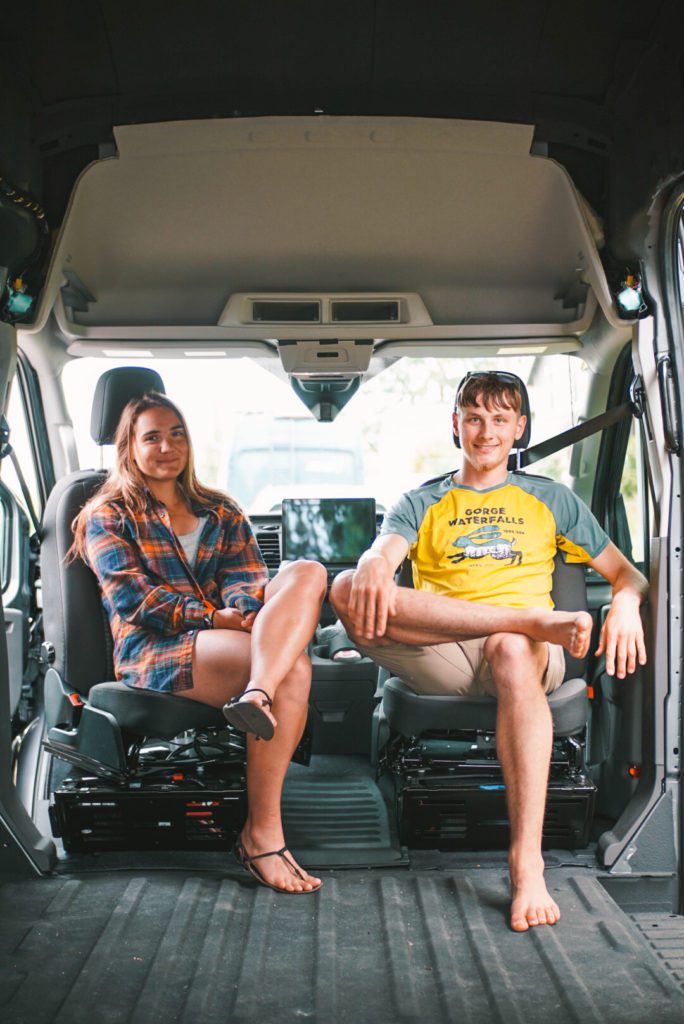

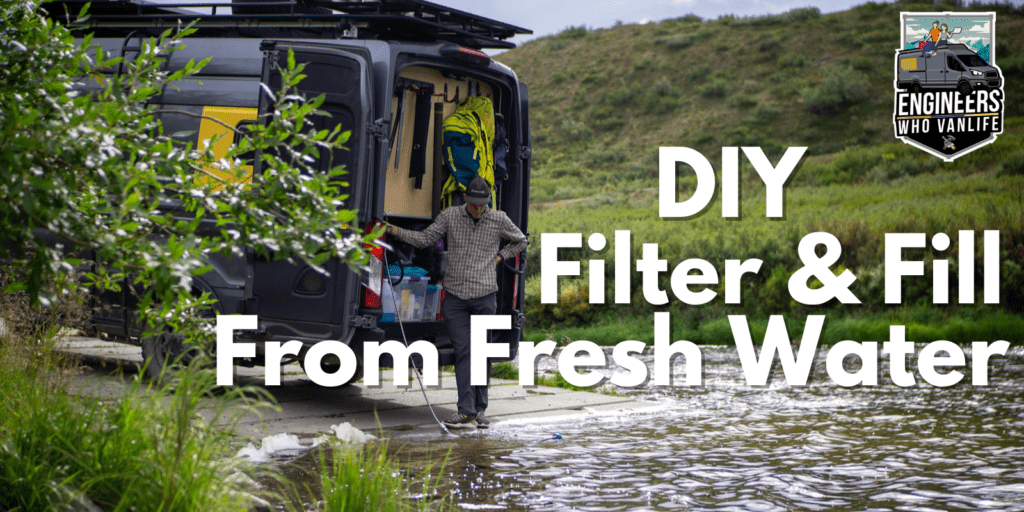

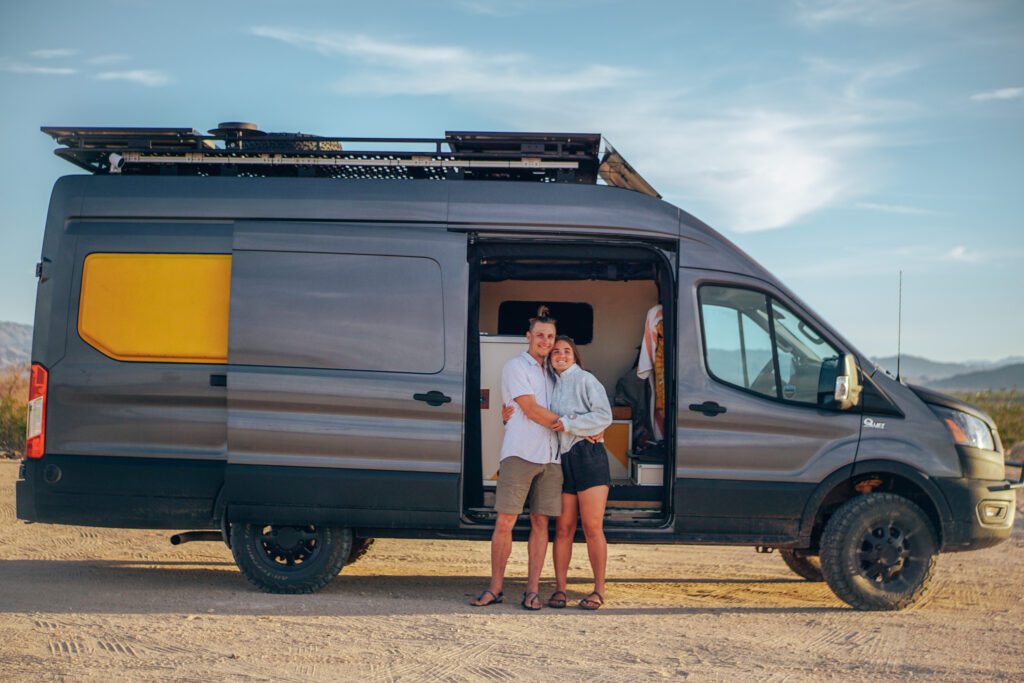

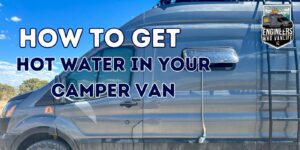
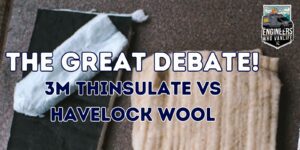
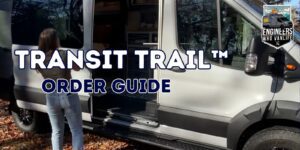


Comments 10
Hi there, great in-depth article. I have very little space for a sink & accompanying systems, so was considering the Icon Lifesaver 20000UF Water Purification Jerry Can. Any thoughts on this super portable option? Thanks
Author
Hi Sarah – great find! The reviews and the specs are definitely something I would trust. Pretty cool that it has a shower option as well. Thanks for sharing.
Thank you for this page! Please could you clarify where to place the clear source filters? Should it be betwren the water tank and the shurflo pump and accumulator, or after the pump and accumulator?
Thank you
Author
Great question! We would recommend AFTER the pump and accumulator.
Thanks for helping me understand that the best option that you should get is something that will make you comfortable drinking water from it. I want to learn more about the different options I have when it comes to water treatment systems so that I can find the best one for my family to keep us safe. We will be having them installed on our campervan when we go on a trip for a month.
to clarify – not for a continuous running shower, but for the reuse of cleaned water use across the shower & kitchen
A curiosity I’ve had – has there been a setup where you could use your water filter on gray water overnight? For example, say I use my ~10 gals of water that day with typical van life practices and leave-no-trace products, then overnight the water filters, and I can use the same water again the next day. Maybe I clean the filters or change the water out every week, or every few weeks. Have you heard of a system like this?
Author
Hey Mary! We have seen the recirculating showers like you have eluded too, but not for grey water. I would imagine that would clog up the filters pretty quickly and filters aren’t cheap. If you do go this route, I would be extra sure to make sure you get the proper micron filtering as well for bacteria from food.
Hey guys, nice guide, but are you serious about the funfact?
“Fun fact, one gram of activated carbon has 32,000 feet of surface area!”
How could a surface area ever be measured with a linear unit?
Author
Ah! Thanks, yes we are serious but there is a typo. It should be 32,000 SQUARE feet.